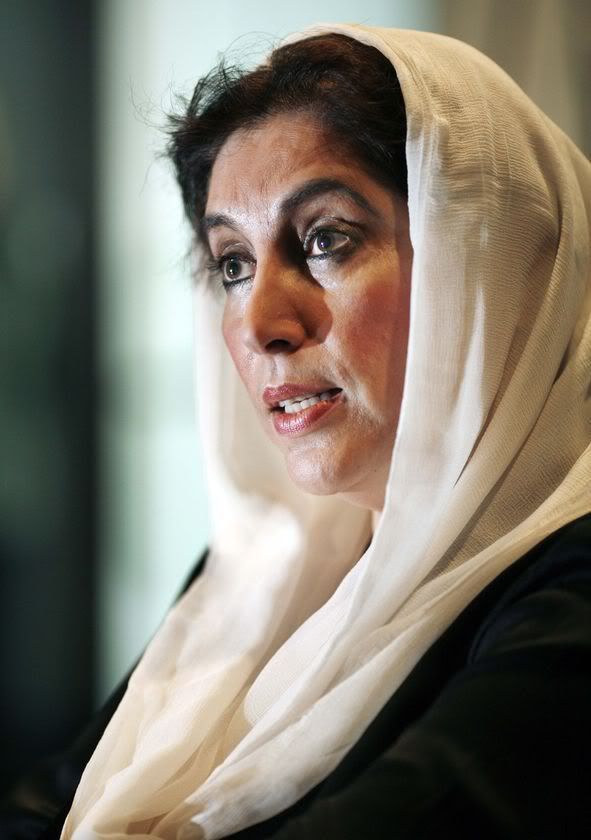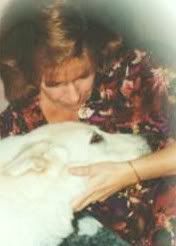Update - Bloggers there on the scene like Five Rupees are giving minute by minute details of violence, more deaths, shops closing, roads shut down, and chaos breaking out everywhere.
 Gunmen shoots Benazir Bhutto then blows himself up.
Gunmen shoots Benazir Bhutto then blows himself up.Bloomberg-Pakistan's Bhutto Assassinated in Attack at Rally
NY Times-Bhutto Assassinated in Attack on Rally, at least 22 more killed with dozens injured in bombing
US STOCKS-Futures fall after reports Pakistan's Bhutto killed
Note: As presidential candidates come forward with statements, McCain just commented and praised Bhutto then went into campaign mode talking about our national security.
History:
Benazir Bhutto a hero to some, had an arranged marital union in 1987 setup by her mother. Her husband, Asif Ali Zardari and his family, by Bhuttos’ standards, were of modest means. Benazir was accused of more corruption than her father and accusations of the death of her brother. As leader she was involved in corruption while serving twice as prime minister, first in the late 1980s and later in the mid-1990s. Bhutto stands accused of stealing roughly $1.5 billion, mostly in the form of kickbacks on government contracts. The Harvard- and Oxford-educated Bhutto was the leading opposition politician in Pakistan, she was more popular in the West than at home. Bhutto’s regime is remembered for having one of the worst human rights records in Pakistan's history, and her government did not allow the freedom of media she criticizes Musharraf for interfering with. Bhutto was due to face corruption cases in Britain, Spain and Switzerland.
During her first 20-month long premiership, astonishingly, she failed to pass a single piece of major legislation. Her reign was marked by massive human rights abuse: Amnesty International accused her government of having one of the world’s worst records of custodial deaths, extrajudicial killings and torture. Bhutto’s premiership was also distinguished by epic levels of corruption. In 1995 Transparency International named Pakistan one of the three most corrupt countries in the world. Bhutto and her husband, Asif Zardari - widely known as “Mr 10%” - faced allegations of plundering the country.
Criminal charges, intended to punish or intimidate, were arbitrarily brought against political opponents and journalists who exposed human rights violations. Torture, including rape, in police and paramilitary custody was widespread and systematic, leading to at least 70 deaths more on Bhutto's questionable past
Benazir Bhutto served as Prime Minister for two terms: 2 December 1988 to 6 August 1990 and from 19 October 1993 to 5 November 1996.
In 1994, extrajudicial killings, torture, persecution of religious minorities, arbitrary detention, discrimination against women etc continued. There were several reports of extrajudicial executions in Sindh as a direct result of conflict between the government and the Mohajir Qaumi Movement, a political party. Ms Bhutto was also responsible for muzzling of the independent media. On 29 June 1995, the government banned six Karachi-based news dailies for 60 days under the Maintenance of Public Order ordinance (MPO) of 1960 and canceled the publishing licenses of another 122 publications linked to the banned dailies. On 14 September 1995, Farhan Effendi, a correspondent of Urdu daily Parcham, was arrested by the paramilitary Rangers and tortured in custody. Asian Centre for Human Rights
Bhutto's niece speaks of her father's assassination at the hands of his sister, Benazir ""My father was Benazir's younger brother, to this day, her role in his assassination has never been adequately answered. My father was a member of Parliament and a vocal critic of his sister's politics. He was killed outside our home in 1996 in a carefully planned police assassination while she was prime minister. There were 70 to 100 policemen at the scene, all the streetlights had been shut off and the roads were cordoned off. Six men were killed with my father. They were shot at point-blank range, suffered multiple bullet wounds and were left to bleed on the streets."
Wiki lists The Charges of Corruption but I'm not sure how thorough it is, considering the bio of this woman is highly slanted on wiki, in favor of her.
The determination and stubbornness for which Ms Bhutto was renowned was first seen after her father was imprisoned and charged with murder by Gen Zia ul-Haq in 1977, following a military coup. Two years later he was executed.
Ms Bhutto was imprisoned just before her father's death and spent most of her five-year jail term in solitary confinement BBC
During her two terms in the office of Prime Minister in Pakistan, Benazir Bhutto, daughter of Zulfiqar Ali Bhutto acquired wealth and cash worth a few hundred million dollars, most of which is located in Europe and Middle East.
The Bhuttos are among a few hundred so-called feudal families, mostly large landowners, that have dominated politics and business in Pakistan since its creation in 1947. Benazir’s father, Zulfiqar Ali Bhutto was an Oxford-educated landowner who became Pakistan’s prime minister in the 1970s, only to be ousted and jailed in 1977 when his military chief, Gen. Mohammed Zia ul-Haq, mounted a coup. Zulfiqar was hanged two years later, after he refused Zia’s offer of clemency for a murder conviction that many Pakistanis regarded as politically tainted.
When Benazir Bhutto took office as prime minister again, after a victory in 1993, Bhutto struck many of her friends as a changed person, obsessed with her dismissal in 1990, high-handed to the point of arrogance, and contemptuous of the liberal principles she had placed at the center of her politics in the 1980s. Moreover, twin posts, as prime minister and finance minister, gave her virtually free rein. Asif Zardari became her alter ego, riding roughshod over the bureaucracy although he had no formal economic powers until Bhutto appointed him Investment Minister, reporting only to herself, in July 1996. They maintained an imperial lifestyle in the new prime minister’s residence in Islamabad, a $50 million mansion set on 110 acres on an Islamabad hilltop. Among the transactions Zardari exploited, according to these officials: defense contracts; power plant projects; the privatization of state-owned industries; the awarding of broadcast licenses; the granting of an export monopoly for the country’s huge rice harvest; the purchase of planes for Pakistan International Airlines; the assignment of textile export quotas; the granting of oil and gas permits; authorizations to build sugar mills, and the sale of government lands. Benazir Bhutto and Zardari took pains to avoid creating a documentary record of their role in hundreds of deals. The couple adopted a system under which they assigned favors by writing orders on yellow Post-It notes and attaching them to official files. After the deals were completed, the notes were removed, destroying all trace of involvement.
Canada Free Press




